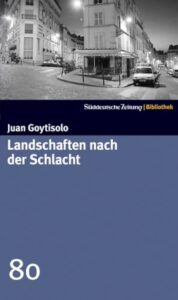What was good about Landschaften nach der Schlacht (Landscapes After the Battle)? Well, it’s short. It’s also written in short sections, which I tend to appreciate when I’m reading in German. Looking through the table of contents, I don’t think that I see any sections longer than five pages; most of them are two or three pages, and several are less than a page. I wonder if each one was a day’s work, and Goytisolo knocked the book out in two or three months.
Somewhat more seriously, Landscapes After the Battle is a glimpse of a gritty Paris of the late 1970s and a portrait of a political exile from Franco’s Spain who is not, frankly, holding together well at all after decades in France. Goytisolo also plays with the boundaries between realistic fiction and something else, bringing in absurd elements throughout the book, presumably to disorient the reader and point toward something else. What that something else might be, I can’t quite say because Goytisolo also assigns an array of repulsive traits and actions to his protagonist. He’s a flasher. He’s a pedophile — he draws parallels between himself and Lewis Carroll, while maneuvering in the parks of his Parisian quarter to get girls away from their mothers or minders so that he can either take pictures of them or flash them. Judging from his commentary about the people he sees, or people he remembers, the protagonist is racist; I don’t remember if he’s specifically anti-semitic, but that seems likely. I mean, why miss out on a vice? There are other degrading and disgusting passages throughout the book — there is an extended bit about anal penetration with a carrot, for example — almost as if Goytisolo is asking his readers if they can take it, if they dare to read through all of the character’s appalling aspects. Sure, but why? Who cares?
It is possible to glean that the protagonist, like the author, was a committed anti-Francoist, exiled from Spain and eking out a living in France. (Though Goytisolo’s success as an author meant that by the time Landscapes was published he was sought as a guest professor in several countries, hardly a down-and-out existence.) The political exiles continue their struggles against the regime in Spain, but they will never have any effect and they know it, though they tell themselves otherwise. The sadness of the people who had lost the war and lost their homeland, persisting decade after decade in struggles that had ended in the 1930s was one few emotions in the book that I found genuinely affecting. There are also moderately amusing scenes about the inevitable political splintering that happens in exile, but the “People’s Front of Judea” bit in “Life of Brian” is both funnier and more pointed. In other parts of the book, the protagonist claims to be the last of a persecuted people, the Oteken, and zooms off into unmoored fantasies about their life and legends.
While reading, I flagged several pages as places where Goytisolo let some humor shine through, but re-reading them now to find precise quotations, I’m not even cracking a smile. I also remember passages where the author inserted himself directly into the text and either addressed the reader or implied that he and the protagonist were one and the same. Even as a literary game where an author is inviting a reader to consider the blurry lines surrounding any fiction, direct self-insertion is probably my least favorite authorial affectation. I was tired of it a good 30 years ago, and if I had known it featured in Landscapes, I probably would have skipped the book entirely. Unfortunately, I neglected to note the page numbers of these passages, and given my reaction to the rest of the book I’m not going to comb through the text to find them. Anyway.
The biographical note that the publisher attached to Landschaften nach der Schlacht calls Goytisolo one of the most important contemporary Spanish authors, and this article from The Guardian makes the case that he’s at least interesting both as a writer and a literary personality. I hope his other books are better — his trilogy of Masks of Identity, Count Julian, and Juan the Landless seems the best regarded — but after this one, I am not likely to find out.


2 pings
[…] an early-1980s novel set in Paris by a major author, Young Once is miles better than Landscapes After the Battle. Modiano shows the seedy side of Paris without reveling in it, without taking the exploiters’ […]
[…] The Tsar’s Madman 79. Marlene Streeruwitz: Verführungen (Seductions) 80. Juan Goytisolo: Landscapes After the Battle 81. Isaac Bashevis Singer: Enemies, A Love Story 82. Ricarda Huch: Der Fall Deruga (The Case of […]